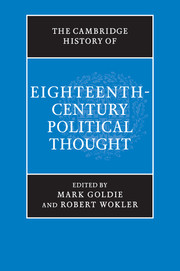Book contents
- Frontmatter
- Introduction
- Part I The ancien régime and its critics
- Part II The new light of reason
- Part III Natural jurisprudence and the science of legislation
- Part IV Commerce, luxury, and political economy
- Part V The promotion of public happiness
- Part VI The Enlightenment and revolution
- 21 The American Revolution
- 22 Political languages of the French Revolution
- 23 British radicalism and the anti-Jacobins
- 24 Ideology and the origins of social science
- Biographies
- Bibliography
- Index
24 - Ideology and the origins of social science
from Part VI - The Enlightenment and revolution
Published online by Cambridge University Press: 28 March 2008
- Frontmatter
- Introduction
- Part I The ancien régime and its critics
- Part II The new light of reason
- Part III Natural jurisprudence and the science of legislation
- Part IV Commerce, luxury, and political economy
- Part V The promotion of public happiness
- Part VI The Enlightenment and revolution
- 21 The American Revolution
- 22 Political languages of the French Revolution
- 23 British radicalism and the anti-Jacobins
- 24 Ideology and the origins of social science
- Biographies
- Bibliography
- Index
Summary
The invention of the modern nation-state
The American and French Revolutions of the late eighteenth century were each preceded and accompanied by lofty debates about constitutional principles, whose prospects of imminent enactment lent a sense of urgency to the fulfilment of philosophical ideals. Notions of a state of nature and a social contract had long been decried as illusions that could not account for the complexity of even our most primitive associations, but in overthrowing the trappings of government in two widely separated continents, legislators of modern republicanism in the United States and France made such abstractions appear credible, as if through their endeavours an earthly paradise might be regained and the first liberated citizens of large and durable republics since the demise of classical Rome could aspire to genuine self-rule. No less than in England around the time of its Civil War of the 1640s, there appeared, in America for about a decade before 1787 and in France for a similar period from 1789, a collection of classic works, some by leading statesmen or major figures in public life, each of which sought to plot a fresh path for civil institutions that had still to be born. These include Paine’s Common Sense (1776), Hamilton, Madison, and Jay’s Federalist Papers (1787–8), and, in France, Sieyès’s Qu’est-ce que le Tiers-Etat? (What is the Third Estate?, 1789) and Condorcet’s Esquisse d’un tableau historique des progregrave;s de l’esprit humain (Sketch of an Historical View of the Progress of the Human Mind, 1795).
- Type
- Chapter
- Information
- The Cambridge History of Eighteenth-Century Political Thought , pp. 688 - 710Publisher: Cambridge University PressPrint publication year: 2006
- 5
- Cited by



